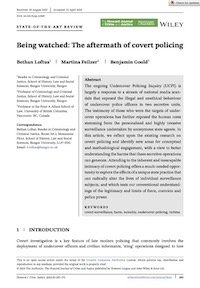By Europol. Strategic Group on Technology and Ethics
Europol was mandated in 2019 by the EU Justice and Home Affairs ministers to create an Innovation Lab to support the law enforcement community in the area of innovation. The Lab aims to identify, promote and develop concrete innovative solutions in support of the EU Member States’ operational work. These will help investigators and analysts to make the most of the opportunities offered by new technology to avoid duplication of work, create synergies and pool resources. The activities of the Lab are directly linked to the strategic priorities as laid out in Europol Strategy 2020+, which states that Europol shall be at the forefront of law enforcement innovation and research. The European Clearing Board for ‘Tools, Methods and Innovations in the field of technical support of operations and investigations’ (EuCB) was launched by the Heads of Europol National Units (HENUs) in their meeting of 5 November 2020. It is composed of Single Points of Contact (SPoCs) from the Europol Innovation Lab, all EU Member States and the four Schengen-associated countries. SPoCs meet regularly in plenary meetings, during which they update each other on innovative projects and tools and decide on new joint collaboration activities. The Strategic Group on Technology and Ethics was founded in 2021 under the umbrella of the EuCB. Currently, the group is composed of representatives from Australia, Netherlands, Norway, Slovenia, Spain, Sweden and the UK. One of the objectives of the group has been to create these guidelines ‘Assessing technology in law enforcement: A method for ethical decision-making’ for the benefit of all EuCB members. A method for applying ethics in practical decision-making Digital transformation and technology are vitally important in enhancing order and security but may also pose a threat to fundamental rights and freedoms. This document presents a method for assessing novel technology from a perspective of widely accepted values and principles. The guidelines contain a description of the central values and ethical principles, and give examples in the form of use cases, illustrating how they may be applied in structured decision-making and evaluation, in situations involving new technology in law enforcement. The use cases show how the method can be helpful in forming transparent and understandable arguments for trustworthy decisions about the adoption and use of various types of technology in law enforcement. The values and principles discussed here are also valuable when cooperating European law enforcement authorities are in search of common moral ground in their respective practices. The work of the Strategic Group on Technology and Ethics is based on methods used in clinical ethics committees and insights from value-based practices in policing – in addition to studies of ethical guidelines for technology and a survey of values central to European law enforcement authorities. Part I of the guidelines explains the seven steps of the method, while Part II sets out use cases to illustrate the application of the method in practice. Precautions regarding the use cases It should be noted that the use cases in Part II have not been legally vetted. They serve to illustrate the present method, and although the conclusion of a use case may be that it is ethical to use the technology (under certain conditions), this should NOT be understood as a conclusion concerning its legality. Legal regulation of law enforcement’s use of technology exists on many levels, both nationally and internationally, and it is beyond the mandate and resources of the Strategic Group on Technology and Ethics to perform a legal assessment of each use case scenario. It is a virtue of the present guidelines that they provide for transparency concerning the principles and values taken into consideration by the decision-maker, and ensure that the making of a decision is specific with respect to local, political, social, cultural and economic contexts, and the technology in question. This also implies that the use cases will never merely be copied to a domestic setting. While they may provide guidance and inspiration, the decision-maker is always responsible for producing an original assessment that takes account of the concrete circumstances in the actual situation. Ethics and the law To the members of Europol, it is fundamental that any development and deployment of technology in law enforcement must be lawful. For the purpose of these guidelines, it is thus assumed that, in a concrete case, issues of legality have already been duly addressed according to appropriate procedures. In the field of new technologies in law enforcement, however, the law may sometimes lag behind, leaving grey areas that are open for interpretation. A structured ethical approach, as presented in these guidelines, may shed light on the values and principles involved, and suggest which interpretation is ethically defendable. In the same vein, the present value-based reflective method may play a constructive role in the legislative process, by making visible – and more understandable – the ethical concerns that legislators should take into account when striking the balance between freedom and security in the field of law enforcement. Law enforcement’s development and/or use of new technology also regularly raises issues related to fundamental rights, where law and ethics are closely intertwined and the lines between the two may become blurred. This, too, leaves space for the present method to contribute with new perspectives and enrich our understanding of the issues at stake. A ‘living’ document The intention is to make this a ‘living’ document, that is, a document that captures new technology as well as novel applications of technology already in use. This is provided for by the expansion over time of the collection of use cases, which may integrate further developments in this area on European and national levels. This should also be reflected in Initiatives for training in the use of the method. By its dynamic character the document aims to be a durable resource for law enforcement authorities and policy makers.
Europol 2025. 30p.









